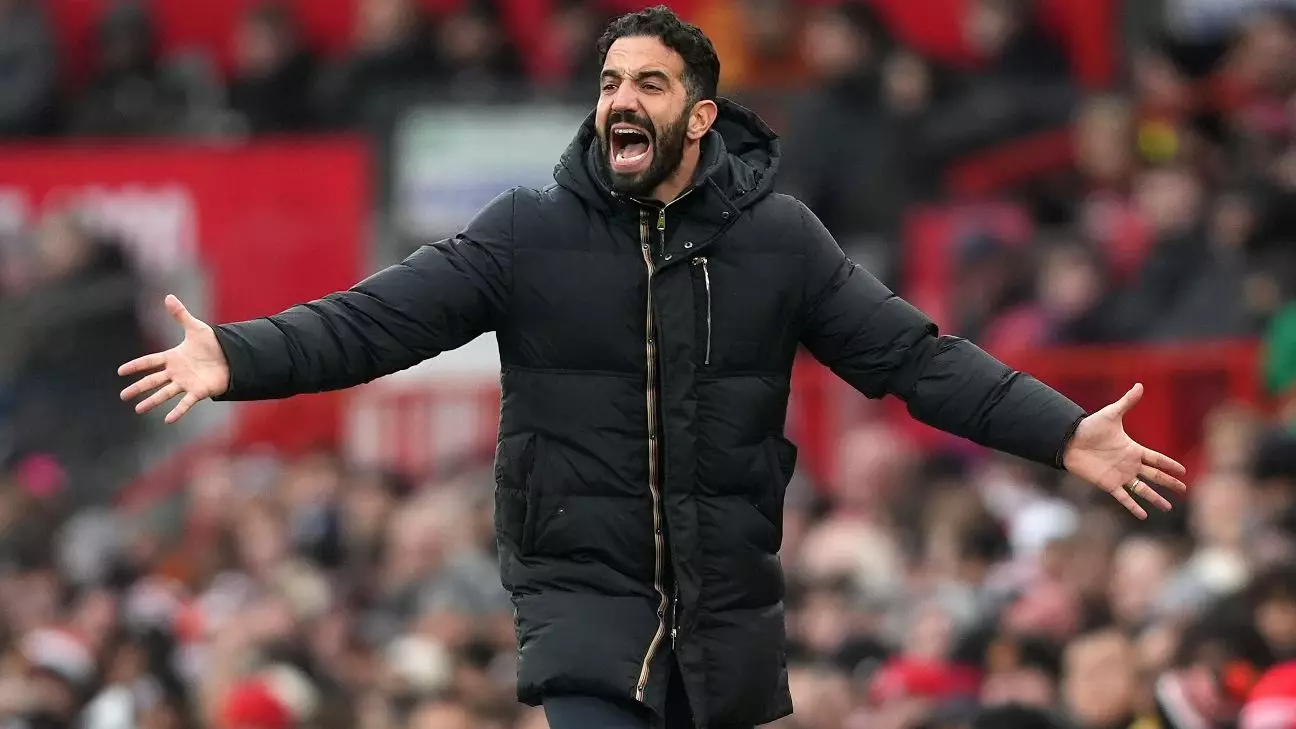The role of a head coach in professional football is often likened to that of a tightrope walker, where a misstep can lead to dire consequences. This metaphor aptly encapsulates the current situation surrounding Manchester United’s manager, Ruben Amorim. Since stepping into the role in November, Amorim has found himself in a precarious position, facing mounting scrutiny as the second half of the season unfolds. With a disheartening record of losing seven out of 13 Premier League matches, Amorim’s admission that he is “fighting for his job” is a stark reminder of how quickly fortunes can change in the world of football management.
At the heart of Amorim’s battles lies the club’s decision-making during the January transfer window. The Portuguese manager has acknowledged that the approach taken by Manchester United was indeed “a risk.” The failure to significantly bolster the squad, especially in attacking positions, raises eyebrows and evokes concern from the fan base. With key players like Antony and Marcus Rashford departing, or rather being pushed out the door, the team finds itself floundering in the attacking third. The recent acquisitions of defenders Patrick Dorgu and Ayden Heaven hardly compensate for the offensive void, making Amorim’s strategy vulnerable.
Amorim himself pointed out the precarious nature of his tenure, stating, “I look at the schedule, I look at the team, and I understood my decision of changing everything in the middle of the season without new signings is a danger for a coach.” This sentiment highlights the balance between ambition and realism that he must strike while trying to implement his vision.
Despite the adversity he faces, Amorim remains steadfast in his vision for the club. He emphasized the need for patience and continuity in his plans, insisting that training time will ultimately yield better performance. “We want to win some games, we can improve our team, we will have time to train,” he remarked optimistically. This belief in potential improvement reflects a long-term strategy that many supporters may find hard to reconcile in the face of immediate results.
However, the loyalty Amorim is asking for in the form of time may not be universally shared among fans and pundits. The growing expectation for instant gratification in modern football often turns a blind eye to the complex dynamics of team-building. The question remains: can Amorim’s vision justify the current downturn in form, or will the demand for results prove too great to maintain his position through the summer?
As the squad adjusts to shifting personnel, Amorim acknowledges that the team’s identity must evolve. His decision to instigate a transformation without additional resources has left players and supporters in a state of uncertainty. He seeks a specific player profile that aligns with his tactical philosophy; however, this precarious balancing act raises significant questions about whether existing squad members can adapt quick enough to his desired style, especially when the pressure for results crescendos.
The recent loan of Marcus Rashford to Aston Villa has only compounded the scrutiny on Amorim’s tactical choices. Fielding questions about the England forward has created an uncomfortable atmosphere, and his quip about passing responsibility to Unai Emery demonstrates both humor and an acknowledgment of the complex web of narratives that cloud his role at United.
Ruben Amorim’s bid to reshape Manchester United is fraught with challenges and risks, reflecting the volatile nature of football management. As he grapples with significant defeats and an uncertain squad dynamic, his assertion of “fighting for his job” resonates loudly. The coming weeks will be pivotal, testing both his tactics and the club’s faith in his long-term vision. United supporters will be watching closely, hoping that their club can reclaim its former glory with the fresh approach of a beleaguered yet determined manager. Ultimately, this saga is a testament to the unpredictable nature of sport; while the storm clouds gather now, the dawn of improvement could still break on the horizon if Amorim’s gamble pays off.

Leave a Reply